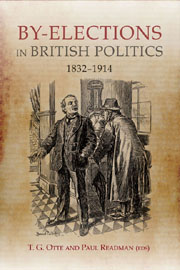Book contents
- Frontmatter
- Contents
- List of Figures and Tables
- List of Contributors
- Preface and Acknowledgements
- List of Abbreviations
- Introduction
- 1 ‘Plumping Contests’: The Impact of By-elections on English Voting Behaviour, 1790–1868
- 2 Government Appointment By-elections: 1832–86
- 3 ‘We should have had 1,000’: The By-elections of the 1874 Parliament
- 4 ‘The Glamour of Independence’: By-elections and Radicalism during the Liberal Meridian, 1869–83
- 5 ‘The Swing of the Pendulum at Home’: By-elections and Foreign Policy, 1865–1914
- 6 By-elections and the Modernisation of Party Organisation, 1867–1914
- 7 ‘A Terrific Outburst of Political Meteorology’: By-elections and the Unionist Electoral Ascendancy in Late-Victorian England
- 8 Land Reform and By-elections, 1885–1914: Do By-elections Matter?
- 9 Edwardian By-elections
- 10 Lloyd George, Limehouse and the Realignment of British Politics: The Bermondsey By-election of 1909
- 11 By-elections and the Peculiarities of Scottish Politics, 1832–1900
- Index of By-election Contests
- General Index
6 - By-elections and the Modernisation of Party Organisation, 1867–1914
Published online by Cambridge University Press: 05 May 2013
- Frontmatter
- Contents
- List of Figures and Tables
- List of Contributors
- Preface and Acknowledgements
- List of Abbreviations
- Introduction
- 1 ‘Plumping Contests’: The Impact of By-elections on English Voting Behaviour, 1790–1868
- 2 Government Appointment By-elections: 1832–86
- 3 ‘We should have had 1,000’: The By-elections of the 1874 Parliament
- 4 ‘The Glamour of Independence’: By-elections and Radicalism during the Liberal Meridian, 1869–83
- 5 ‘The Swing of the Pendulum at Home’: By-elections and Foreign Policy, 1865–1914
- 6 By-elections and the Modernisation of Party Organisation, 1867–1914
- 7 ‘A Terrific Outburst of Political Meteorology’: By-elections and the Unionist Electoral Ascendancy in Late-Victorian England
- 8 Land Reform and By-elections, 1885–1914: Do By-elections Matter?
- 9 Edwardian By-elections
- 10 Lloyd George, Limehouse and the Realignment of British Politics: The Bermondsey By-election of 1909
- 11 By-elections and the Peculiarities of Scottish Politics, 1832–1900
- Index of By-election Contests
- General Index
Summary
Between the 1868 general election and the end of 1914, a total of 1,357 by-elections took place in Britain, of which 814 (60%) were contested. These contests were the focus of considerable attention from party activists, not only in their organisational efforts to retain or gain the seat, thereby conserving or augmenting their party's strength in the Commons, but also in assessing the implications of by-election results for the likely outcome of the succeeding general election. Gladstone's articles on ‘Electoral Facts’ in the Nineteenth Century were among the most notable examples of such ‘political meteorology’. However, many contemporaries did not share his faith in the predictive ability of by-elections. Lord Harris told a Conservative gathering in 1889 that by-elections were ‘rather like a weather glass, that is not always right, and not infrequently wrong’. Nevertheless, as the National Liberal Federation's (NLF) report that year observed, it was ‘a noteworthy paradox that while some politicians on both sides profess to undervalue the significance of the bye-elections as a guide to the future decision of the country, yet no passing event excites such vivid attention’. As the Liberal and Conservative parties extended their organisation, particularly in response to the changes to the electoral system wrought by the Corrupt and Illegal Practices Prevention Act (1883) and the Third Reform Act (1884–85), vast resources were poured into by-elections: 132 Liberal meetings were held at the 1905 North Dorset contest, addressed by eighty-three speakers, while Liberal headquarters sent seventy speakers, including twenty MPs, to Ludlow in 1903.
- Type
- Chapter
- Information
- By-Elections in British Politics, 1832-1914 , pp. 151 - 176Publisher: Boydell & BrewerPrint publication year: 2013



